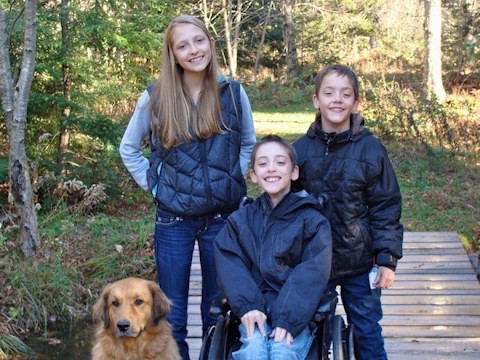
Parenting is a journey. It requires steadfast commitment, strength, and stamina. For parents who have learned their child has a developmental delay or disability, these words take on a deeper and more prodigious meaning.
Twelve years ago our twin sons were born prematurely, and as a result they suffered brain damage. Soon after their birth, they were diagnosed with cerebral palsy.
At first, this diagnosis came as a tremendous blow to my husband and me. I won't deny that there were many challenges. There still are. But over time I've come to see this parenting journey as I see my yoga practice: Every time I get the opportunity to unroll my mat is an chance to see things from a fresh perspective, a new light. This "everything is new" outlook holds true for my yoga practice and carries over to my parenting.
There are countless lessons my yoga practice has given me, but here are five core principles I've found that have directly helped me in raising our sons.
1. Finding a community of like-minded people will carry you when you're really in need.
There will be plenty of well-intentioned people around you, but look for those who truly support you and let you be you. Parenting a child with a disability can at times create feelings of loneliness and isolation. The world will seem like it's moving much faster, and it's crucial to find people who can support you and allow for you and your child to move at your own rhythmic pace. Find other parents who are going through what you're experiencing. They'll understand your "language" and lift you up when you need it. Find doctors, specialists, and therapists you truly value and enjoy. They will inevitably become part of your community. Reaching out to others is the key to upholding your own emotional fortitude.
2. Keep the posture steady and comfortable.
I constantly need to practice this terse little reminder from Patanjalis sutra. Life is challenging. If you are are parenting a child with a disability, the word "challenge" takes on new depth. Your days are likely filled with appointments, therapy sessions, and other responsibilities to care for your child. You can never get it all done; there will never be enough hours in the day, so remember to keep your days comfortable and do what you can. Not overloading yourself with appointments and expectations will keep you feeling lighter and allow you more joy during day-to-day moments.
3. What matters is what's happening now.
This is particularly true when your child isn't meeting milestones and you begin to notice that their peers take off developmentally. Staying in the moment will keep you strong. Worrying about the future will only deplete your resources. Keep your focus every day, one step at a time.
4. Focus on the breath.
Breathe. Breath is life. Just as we're faced with a challenging pose in yoga, we bring ourselves back to our breath. Focusing on the breath we notice the posture changes in one way or another. We're all powerless over the situations that life hands to us, but this seems especially true parenting a child with disabilities. When things become too much to bear, you always have your breath. I cannot tell you how many times I've had to stop and count out five deep breaths before I've moved forward from an overwhelming or stressful situation. There is a profound shift that happens for me every time I stop and breath.
5. Make time for your own guilt-free self care.
Each day practice letting go. Get sufficient rest, eat to nourish your body, get a massage, have a bath, spend time with a friend — just take some time for yourself. Refueling and allowing for your own needs will help you to release the stress and tension that builds up, and is a critical part of this unique and often arduous parenting path.
Staying with these core yogic principles has helped me meet myself and my children exactly where we are right now. Just as my practice can change from day to day, so does parenting. When I lose sight of these principles and go to a place of compare and contrast, I grow weak. It's important for me to remember that at the core of it all, we have everything we need to feel whole and complete.
